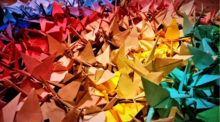On Friday, May 8th, 2020, the Asian Institute hosted a virtual Student Leadership Celebration, and the opportunity to gather and reflect on students’ achievements was deeply meaningful. While the impossibility of assembling in person certainly impacted the dynamics of our event, we were excited that the online version allowed students’ family and friends to join the session—an opportunity that’s not available when we gather in physical spaces.
During the celebration, Asian Institute faculty, including Professors Rachel Silvey, Takashi Fujitani, Tong Lam, Christoph Emmrich and Dylan Clark presented awards to students. The awards reflected the outstanding work of students involved in the following groups and programs:
- Contemporary Asian Studies Student Union (CASSU)
- Synergy: Journal of Contemporary Asian Studies
- Joseph Wong Student Experience Fund
- Re:Locations: Journal of the Asia Pacific World
- Richard Charles Lee Insights through Asia Challenge (ITAC)
- Big Ideas Competition: Exploring Global Taiwan
- David Chu Research Scholarships and Leadership Awards in Asia Pacific Studies
- South Asian Studies Graduate Awards
Many of these awards celebrated students’ exceptional scholarship and transformative extra-curricular activities connected to the Richard Charles Lee Asian Pathways Research Lab (RCL-APRL), including through the Contemporary Asian Studies Student Union (CASSU), the undergraduate academic journal, Synergy, and the Insights through Asia Challenge (ITAC).
Outgoing CASSU Co-Presidents, Minh Anh (Mia) Nguyen and Yilin (Angelah) Liu, delivered moving remarks about their time at the Asian Institute, which they’ve generously shared with us in written form below:
Minh Anh (Mia) Nguyen
I remember my first time sitting in CAS201 with Dr. Clark and thinking to myself, “My parents are gonna kill me if they know I came all the way from Vietnam to study Asia.” Little did I know then what CAS and the Asian Institute would mean to the rest of my undergrad.
Over the course of four years, I’ve witnessed the Asian Institute became another home to many students in diasporic communities. It is at the Asian Institute that we learned to find our identities, our belonging, our sociopolitical views.
If I had to choose one word to describe what the Asian Institute has meant to many of us, it would be “empowerment.” In every course lecture, led by passionate and dedicated faculty members, students are constantly empowered to challenge our own point of views, to resituate our political positions, to critically analyze International Relations from the perspective of South, East and Southeast Asia. We learn to engage in conversations that are controversial, sensitive, sometimes risky, but necessary.
I’ve been empowered to dive deeper. All of us anxious students have been empowered to be mindful about the world that is bigger than our own, to be critical about gender, climate change, immigration, the subaltern class, imagined communities and borders. So I humbly ask you for a favour, generations of leaders at the Asian Institute, to follow your hearts, because it’s easier to ask for forgiveness, than for permission.
Yilin (Angelah) Liu
If CASSU is where I found what I want, the Contemporary Asian Studies program is where I found who I am.
Although it is still too early to say that I found what I want as an undergrad student, joining CASSU, connecting with alumni from a diversity of fields, made me see so many possibilities in the future. By meeting alumni via the Global Careers Through Asia Conference and the mentorship program, it seems like our future goals are getting clearer, and we can see that there are so many paths for us to explore in the future. More importantly, the alumni are role models who have already achieved those goals. They started from where we are today.
I am very honoured and grateful that I could study and work with my Contemporary Asian Studies friends together for three years. I still remember those days and nights when we were handling three essays and two exams in one week, and texting each other “you can do this” at 3:00 AM. But today, all the efforts that we’ve made are worth it. Because studying CAS for three years, for me, was a process of constantly overturning my views—my views about where I from, which nation/imagined community I belong to, what tag should I assign myself, which definition can define me, etc. When my parents keep forgetting what my major is, that is fine because CAS has no static definition, and it is dynamic. It keeps building us into different people with more mature thinking. It keeps broadening our horizons, and it keeps providing us with new perspectives, extending Asia beyond Asia.
In the end, I would like to thank everyone who has supported and helped CASSU—the Asian Institute, the CAS faculty members, and all my comrades in CAS.
